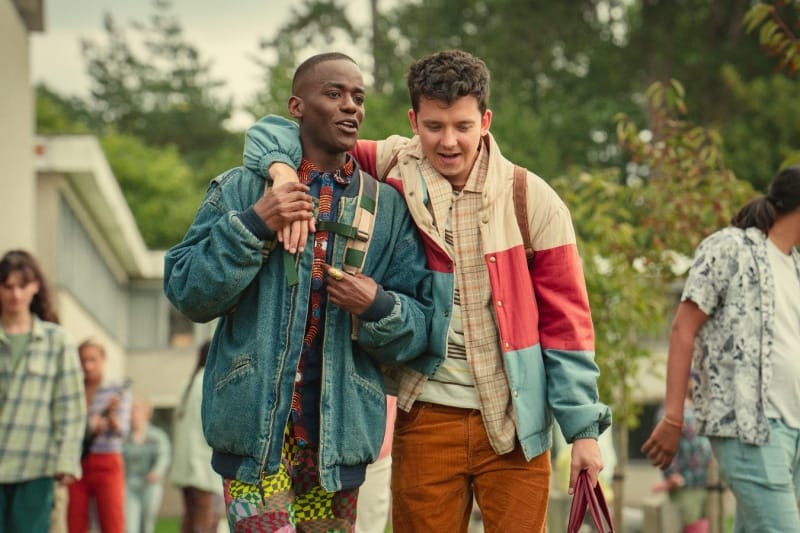Welcome to Previously On, a column that is keeping an eye on the latest returning TV shows. In this edition, Valerie Ettenhofer reviews the fourth and final scene of Netflix’s Sex Education.
Sex Education was a gift that arrived just at the right time. The Netflix series, which is ending with its current fourth season, premiered when America had an alleged rapist as president, and talked with clarity and grace about consent and sexual assault. As lawmakers were working to dismantle abortion rights, the show tackled abortion with an emotional episode that captured the nuance of the choice perfectly – just three episodes into its debut season. Alternately messy and masterfully made, Sex Education taught teens and adults alike about communication, pleasure, identity, and more. And now it’s bowing out, with a season that’s both imperfect and satisfying – and, yes, educational.
The stylish, anachronistic UK-set show endured some surprising cast shake-ups during its off-season, and the latest batch of episodes picks up with a few key castmates conspicuously absent. The show glosses over some disappearances and explains others well enough, and while characters like Lily (Tanya Reynolds) and Olivia (Simone Ashley) are missed, season 4 gets on well enough with the people it does have. The final chapter begins with teen sex therapist Otis (Asa Butterfield), his best friend Eric (Ncuti Gatwa, whose star outshined everyone else in the show, even before he became the Fifteenth Doctor), and several of their friends starting school at a quirky, hipster alternative college. In an intriguing inversion of the show’s first few seasons, here queerness is cool and sex therapy is the norm.
It’s that last point that leads to the season’s weak point, as Otis becomes obsessed with proving himself superior to an outlandishly cool rival therapist named O (Thaddea Graham). Otis has always been an inconsistently written character, prone to selfish single-mindedness and bouts of stupidity that feel out of character with his initially wise-beyond-his-years characterization. The Otis and O plot grates a bit as the season wears on, as does Otis’ mistreatment of Eric, Maeve (Emma Mackey), and newly postpartum Jean (Gillian Anderson). Thankfully, the show itself comes down on the side of everyone else, and while Otis’ faults are irksome, they’re clearly all part of the plan for the season.
That plan turns out to be impressively personal and, in key ways, expectation-defying. While Otis stumbles through his adolescence, other characters complete their character arcs in rewarding and relatable ways. It’s tough for a show to tackle topics including postpartum depression, grief, addiction, anxiety related to medical transition, the intersection of queerness and religion, asexuality, bullying, disability, emotional abuse, and more without feeling like a corny after-school special, yet Sex Ed somehow pulls it off. The show is intentional about its representation, and at times almost utopic in its worldbuilding. It often focuses on moments of queer and trans joy for no other reason than because that’s something queer and trans kids don’t see on TV often enough. Sex Education gives the gift of humanizing people on the margins of society again and again, and it’s so funny and sweet and well-acted that it never gets old.
No season 4 plot hits as hard as Maeve’s, which isn’t a huge surprise given that Otis’ friend-turned-girlfriend has been dealing with adult issues since the show’s early days. Maeve begins the season at a writing program in America, where Schitt’s Creek star Dan Levy (the better of the season’s two major additions, as Hannah Gadsby feels a bit superfluous as Jean’s new boss) plays a strategically negative professor who’s also an acclaimed author. Sex Education has a keen awareness of privilege, and it colors Maeve’s writing program plot – and a much more serious arc that comes after – with deep empathy and understanding. For the most part, Sex Education is a big-hearted comedy, but when it goes dark, it’s also more than capable of becoming a serious tearjerker.
More than anything, Sex Education will be remembered as a show whose writers clearly love the characters that populate its world. Just one episode of the series contains enough compassion (and, when it comes to the sex therapy angle, practical advice) to undo decades’ worth of slut-shaming, morally punishing teen shows. If all of us had a show like this growing up, adolescence would’ve been a whole lot more bearable.
Sex Education doesn’t bow out on a high note so much as a level-headed one. While some plots take surprising turns – and one oddly verges on magical realism – the series’ ending feels right. Like another great teen show that ended this year, Never Have I Ever, Sex Education works to highlight the less traditional paths teens take to adulthood, forsaking the promise of a perfect career or a romantic fairy tale ending in favor of something more sensible. High school can be great, especially in a radically accepting world like this one, but it’s decidedly not the best years of most of our lives. Sex Education knows that, and after four seasons’ worth of triumphant rites of passage, cringing moments of embarrassment, and sweet bonding moments, it ends not with a promise, but with one last truth: life is so much better when you’re good to one another.

